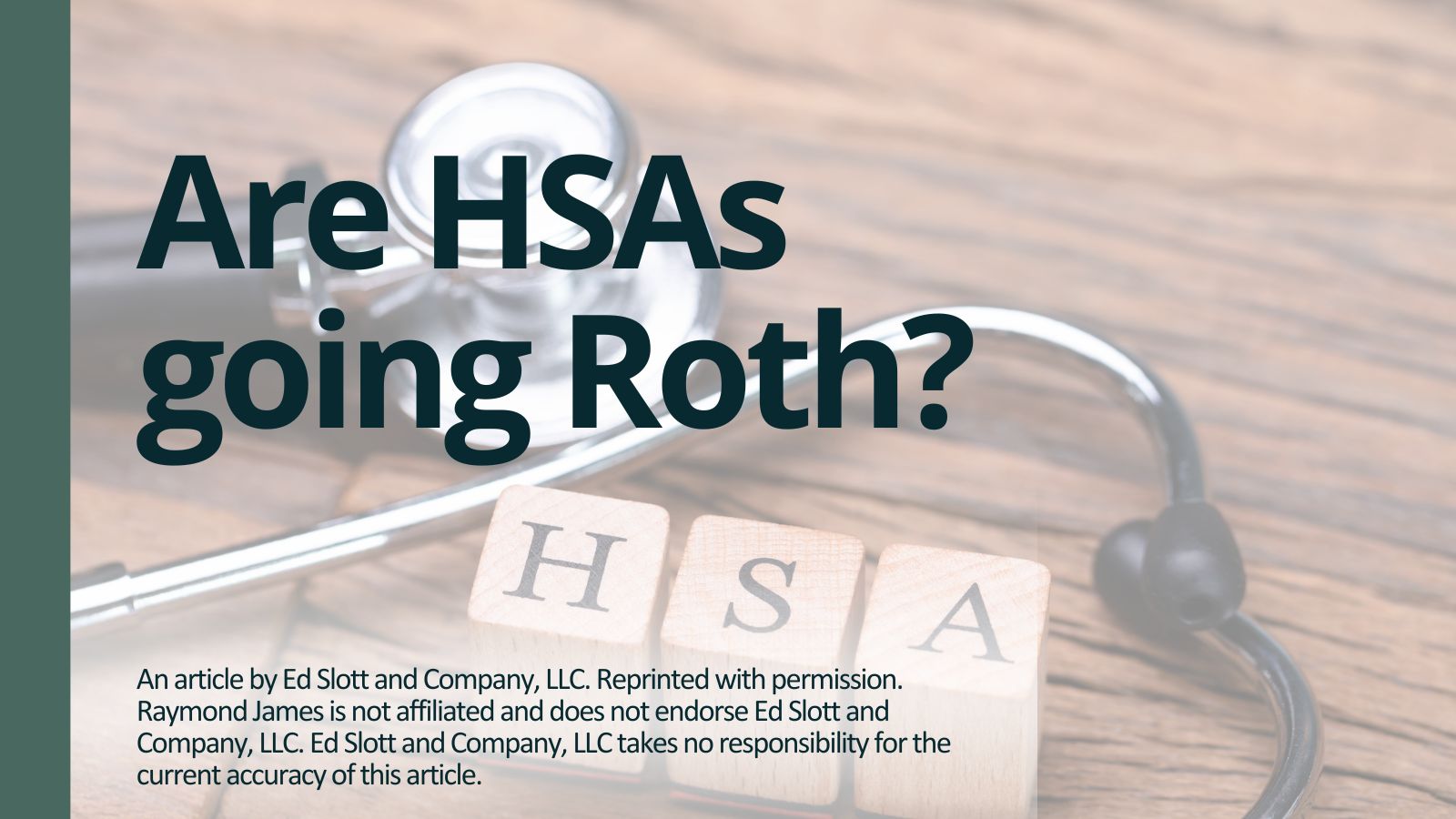Cornerstone is pleased to bring you this article by Ed Slott and Company, LLC, an organization providing IRA education and analysis to financial advisors, institutions, consumers, and media across the country. Our association with this organization helps us stay up to date on the latest developments in IRA and tax law updates. As always, give us a call if you’d like to discuss!
By Sarah Brenner, JD
Director of Retirement Education
Many of the provisions of the Tax Cuts and Jobs Act are scheduled to expire at the end of 2025. There are currently a number of proposals in the works in Congress to extend these tax cuts. A serious hurdle is how to pay for them. One interesting legislative proposal that has surfaced to cover the cost is the possibility of requiring Health Savings Accounts (HSAs) to be made on a Roth basis.
How HSAs Work
Under current law, an HSA is a tax-free account that is used to pay for qualified medical expenses that aren’t covered by insurance. It is similar to an IRA in that it’s a custodial or trust account set up with a financial institution that is owned and controlled by the individual, not by the employer.
Who Can Contribute to an HSA?
In order to contribute to an HSA, an individual must be:
- Covered by a high deductible health plan (HDHP),
- Not enrolled in Medicare, and
- Not eligible to be claimed as a dependent on someone else’s tax return
Tax Benefits of HSAs
Everyone gets a full federal income tax deduction for the HSA contributions they make. There is no income limit or phase-out. It is an above-the-line deduction rather than an itemized deduction, so it’s available even if the standard deduction is taken on the tax return.
HSA withdrawals are tax-free when used to pay for qualified medical expenses of the account owner, his spouse, or dependents. Also, the HSA can be used to reimburse the account owner for qualified medical expenses he already paid for.
What Qualifies as a Medical Expense?
Generally, qualified medical expenses are those that would be eligible for the medical expense tax deduction if someone was itemizing expenses on their tax return. They usually include all medical and dental expenses and prescription drugs (but not over-the counter medicines). IRS Publication 502, Medical and Dental Expenses, has comprehensive lists of what expenses are, and are not, qualified medical expenses.
What if HSA Funds Are Used for Non-Qualified Expenses?
If the HSA is not used for qualified medical expenses, then the distribution is not tax-free but instead is taxed as ordinary income and is also subject to a 20% penalty. If the individual is age 65 or older or has died or become disabled, then the 20% penalty won’t apply, but the distribution is still taxable if it wasn’t used for qualified expenses.
HSAs are an extremely tax-efficient way to pay for medical expenses. HSAs can be used to pay for current medical expenses on a tax-free basis – just like qualified Roth IRA distributions. Plus, regular HSA contributions made by a client are tax-deductible – just like most traditional IRA contributions. It’s like getting the best of both worlds, at least when it comes to medical expenses.
The Impact of Roth HSAs on Taxpayers
Any Roth account is funded with after-tax revenue. Requiring a contribution to an HSA to be made as a Roth contribution would be a win for Congress because they would generate immediate revenue. However, for taxpayers that would be a loss.
While savers could still enjoy the benefit of tax-free distributions if HSAs become Roth accounts, they would lose the ability to deduct their contributions. That seems like a bad bargain for savers.
Membership in Ed Slott’s Elite IRA Advisor GroupTM is one of the tools our advisors use to help you avoid unnecessary taxes and fees on your retirement dollars. Members of Ed Slott’s Elite IRA Advisor GroupSM train with Ed Slott and his team of IRA Experts on a continuous basis to stay on the cutting-edge of retirement, tax law and IRA distribution planning. Through membership, Gordon is immediately notified of changes to tax law changes and updates on retirement planning, case studies, private letter rulings, Congressional action and Supreme Court rulings. In addition, he has 24/7 access to Ed Slott and Company LLC to confer with on complex cases.
Copyright ©2025, Ed Slott and Company, LLC. Reprinted from The Slott Report, https://irahelp.com/slottreport/are-hsas-going-roth/, with permission. Originally posted Monday, January 27, 2025. Ed Slott and Company, LLC takes no responsibility for the current accuracy of this article
Raymond James is not affiliated with and does not endorse the opinions or services of Sarah Brenner, JD, The Slott Report, ED Slott, Ed Slott and Company, LLC, IRA Help, LLC, irahelp.com, or Ed Slott’s Master Elite IRA Advisor Group.
This information, developed by an independent third party, has been obtained from sources considered to be reliable, but Raymond James Financial Services, Inc. does not guarantee that the foregoing material is accurate or complete. Changes in tax laws or regulations may occur at any time and could substantially impact your situation. Raymond James advisors do not provide tax or legal services, you should discuss these matters with the appropriate professional. CSP #714841



